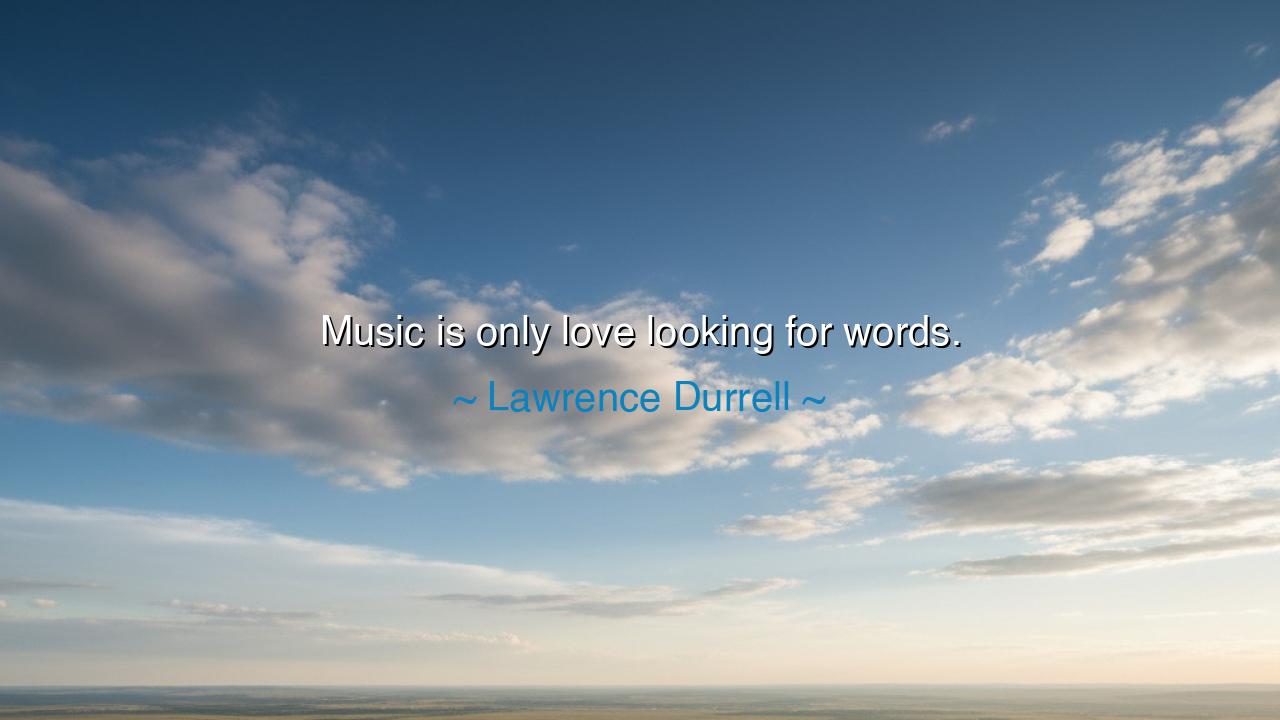
Music is only love looking for words.






"Music is only love looking for words." — thus wrote Lawrence Durrell, the poet of passion and exile, who wandered through the sunlit ruins of the Mediterranean seeking the language of the heart. In these few words, he unveils a truth as ancient as the lyre and as eternal as the soul itself: that music is not a mere art, nor a sound, but the voice of love before it learns to speak. It is the language of emotion in its purest form — the heartbeat of creation itself. When the heart is too full for speech, when the soul trembles beyond the reach of words, then it sings. And that song, Durrell tells us, is love seeking form.
For love and music are twin mysteries, born from the same divine source. Both move unseen, yet both can stir the mountains of the human spirit. Love, when it first awakens in the heart, is formless — it floods the being like sunlight pouring through glass. But the human soul, ever longing to express, seeks a way to shape that feeling. Words falter; language fails. And so, out of this divine restlessness, music arises — a current of sound that gives movement to what cannot yet be spoken. Thus, music becomes love made audible, the invisible turned to rhythm, the eternal given breath.
The origin of Durrell’s quote lies not merely in poetry but in his lifelong fascination with beauty and emotion. Living through war and wandering through lands torn by both chaos and light, he came to understand that human language could not capture the vastness of feeling. He turned, like the ancients before him, to music — that universal bridge between the heart of man and the silence of the divine. For just as lovers’ glances convey more than any speech, so too does melody reveal the secret architecture of the soul. Music speaks where love dwells — beyond intellect, beyond reason, in that sacred place where humanity and eternity meet.
Consider, for example, the tale of Beethoven, who, though deaf, continued to compose symphonies that shook the heavens. What words could describe the anguish of a man who could no longer hear the world, yet still carried within him the harmony of the universe? His Ninth Symphony, written in silence, is not merely sound — it is love crying out for words that will never come. It is the triumph of spirit over limitation, the pure translation of feeling into music. In that act, Beethoven became what Durrell describes: a lover seeking language through melody, a soul so filled with emotion that only sound could carry its truth.
So too in the ancient world, the poets and prophets knew that music was sacred. The Greek philosopher Pythagoras spoke of the “music of the spheres,” the harmony that binds the stars themselves in cosmic order. To him, the universe was a song, and every human life a note in that divine composition. And is not love the same? It binds the scattered pieces of existence into unity, gives meaning to chaos, and reveals the order beneath all things. Thus, music and love are not separate paths, but one and the same melody played on different instruments of the soul.
Durrell’s words also speak to a deeper truth about human vulnerability. To love is to open oneself, to feel without defense, to live without armor. Music, in its essence, is the same — it bares the heart before the world. When we hear a song that moves us, we are not merely listening; we are remembering the language of our own soul. A melody can resurrect a memory, awaken forgotten tenderness, or soothe a grief too ancient for tears. In that moment, we understand what Durrell meant: that music is love searching for a home in sound, seeking to be heard, seeking to be known.
To live by this wisdom, one must learn to listen with the heart, not merely the ears. When you hear music, let it move through you as prayer, not as noise. When you create — whether through song, word, or act — let it come from love, not ambition. For every true act of creation is a form of music: a melody of compassion, a rhythm of giving, a harmony between the self and the world. The painter’s brush, the poet’s pen, the laborer’s hands — all can sing, if love moves through them.
So, my children, remember this teaching: Love and music are one eternal current, and both seek expression in the vessel of your life. When you love, let your love sing; when you create, let your creation love. Speak less with words, and more with the honesty of your feeling. For as Lawrence Durrell taught us, music is only love looking for words — and perhaps the greatest act of wisdom is to realize that the truest words will never be spoken, only sung by the heart.






AAdministratorAdministrator
Welcome, honored guests. Please leave a comment, we will respond soon